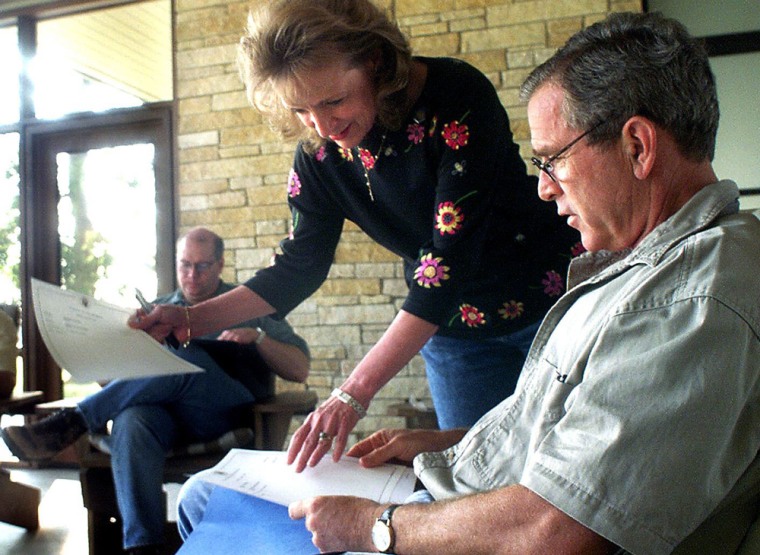Among a host of qualities that White House counsel Harriet Ellan Miers shares with new Supreme Court Chief Justice John Roberts is the apparent lack of any personal legal agenda. Known for an exacting, no-nonsense style, Miers — like Roberts — tends to avoid the limelight.
Once described by White House chief of staff Andrew Card as “one of the favorite people in the White House,” Miers has been there for President Bush at every turn for more than a decade.
She was Bush’s personal lawyer in Texas, took on the thankless job of cleaning up the Texas Lottery when he was governor, and followed him to Washington to serve as staff secretary, the person who controls every piece of paper that crosses the president’s desk.
In 2004, Bush appointed her White House counsel, calling her “a talented lawyer whose great integrity, legal scholarship and grace have long marked her as one of America’s finest lawyers.” He articulated his high regard for her more memorably during a 1996 awards ceremony when he called her “a pit bull in size 6 shoes.”
Miers, 60, has a string of firsts on her resume that track her quiet but steady march to the top echelons of power: first woman hired by her law firm in 1972, first woman president of the Dallas Bar Association in 1985, first woman president of the Texas State Bar in 1992, first woman president of her law firm in 1996.
Helped hide drunk driving arrest
Miers’ loyalty to Bush is above question. When he first decided to run for governor in the early 1990s, he hired Miers to comb his background for anything derogatory that opponents might try to use to defeat him.
Miers also introduced Bush to Alberto Gonzales, who served as Bush’s counsel while governor and later in Washington, before being named U.S. attorney general.
During Bush’s first term as governor, Gonzales used information turned up by Miers to persuade a local judge to excuse Bush from jury duty, a civic task that would have forced him to disclose his 1976 arrest for drunken driving in Maine. The incident was not divulged until the waning days of Bush’s 2000 campaign for the White House.
Federal Election Commission records show Miers contributed $1,000 to Bush when he first ran for the White House in 2000 and $5,000 to the Bush-Cheney Recount Fund in the post-election struggle that finally sealed his victory over Al Gore.
Ironically, she had donated $1,000 to Gore a dozen years earlier, when he first sought the White House.
Miers also gave $1,000 to another prominent Democrat — Lloyd Bentsen, the longtime Texas senator who in 1988 ran for re-election and also was Dukakis’ vice presidential choice on the Democratic ticket that year.
Bentsen won another term in the Senate, but the Republican ticket of George H. W. Bush and Dan Quayle defeated Dukakis and Bentsen.
Loyal to Bush agenda
Card, in a 2003 interview with the publication Texas Lawyer, said Bush’s affinity for Miers is clear in the frequent invitations she receives to visit the presidential retreat at Camp David, “a privilege that is not enjoyed by a lot of staff.”
“She’s a quiet, highly respected force and someone who is seen as not having any agenda other than the president’s,” he said.
Intensely loyal, Miers is happy to stay off the radar screen as long as her boss is happy, on the thinking that White House counsels only make news when there’s been a mistake.
“Hopefully, there aren’t any,” she told the Dallas Morning News earlier this year. “So, we stay out of the headlines.”
At the same time, however, she showed her readiness to take on difficult questions.
“Lawyers by nature are involved in controversy,” she said. “We expect difficult issues and are prepared to deal with them.”
Bush underscored her toughness, observing when he was governor, “When it comes to a cross-examination, she can fillet better than Mrs. Paul.”
Sept. 11 scramble
As White House staff secretary, Miers was with the president in Florida when the terrorist attacks unfolded on Sept. 11, 2001, and she later remembered the regard she felt for him as she scrambled to help prepare his remarks to the nation that night. “It took some time, and the president saw me hurrying to give them to him,” she recalled. “He said, ’Good hustle.’ He made me feel good that I was contributing. Typical.”

Miers is a self-described “Texan through and through.” She grew up in Dallas and received both her undergraduate and law degrees from Southern Methodist University. She clerked for a federal judge there and then joined Locke Purnell Rain Harrell in 1972, rising to become first woman president of the firm in 1996. When her firm merged with another, she became co-managing partner of the 400-lawyer Locke Liddell & Sapp.
“Harriet is not a person that gets frustrated easily,” R. Bruce LaBoon, a former law partner, told Texas Lawyer. “She doesn’t lose her temper. She is very cool and calm in a storm.”
When Bush was governor of Texas, she represented him in a case involving a fishing house. In 1995, he appointed her to a six-year term on the Texas Lottery Commission. She also served as a member-at-large on the Dallas City Council and in 1992 became the first woman president of the Texas State Bar.
Miers came with the president to the White House as his staff secretary, the person in charge of all the paperwork that crosses the Oval Office desk. Miers was promoted to deputy chief of staff in June 2003.
Miers, who is single, is known for putting in long hours without complaint. Education Secretary Margaret Spellings, a fellow Texan who earlier served alongside Miers in the White House, told Texas Lawyer in 2003 that Miers was “here before dawn and after dusk and on most weekends. No one works harder.”
“She never seeks the limelight,” Spellings told Business Week. “She’s just extremely devoted to the president.”
Miers reveals little of her own emotions or ideological persuasions, but has been an enthusiastic supporter of the Bush administration on a broad of initiatives including tax cuts, Social Security reforms, restrictions on federal spending on embryonic stem cell research, national security, education reforms and fighting terrorism.
In hosting an “Ask the White House” interactive forum on the Web before the 2004 elections, Miers lavished praise on a litany of Bush administration initiatives, then added, “I could go on and on.”
